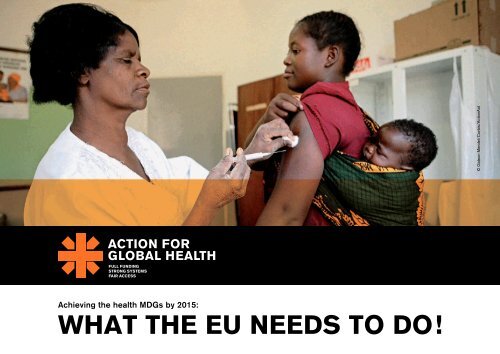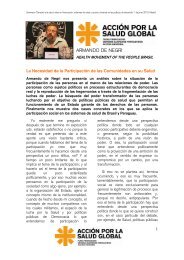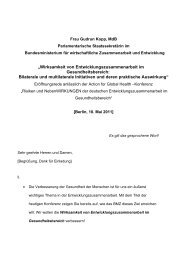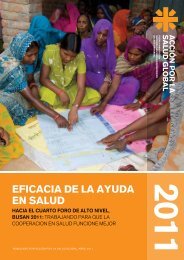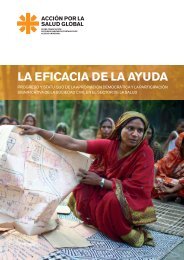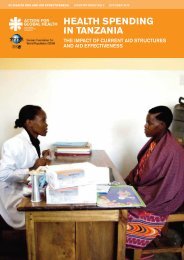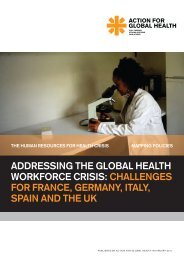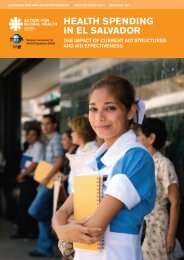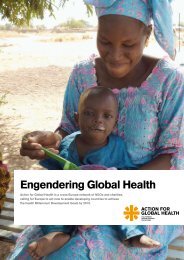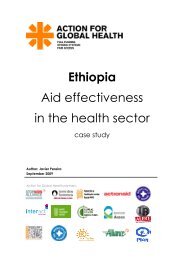WHAT THE EU NEEDS TO DO! - Action for Global Health
WHAT THE EU NEEDS TO DO! - Action for Global Health
WHAT THE EU NEEDS TO DO! - Action for Global Health
Create successful ePaper yourself
Turn your PDF publications into a flip-book with our unique Google optimized e-Paper software.
Achieving the health MDGs by 2015:<br />
<strong>WHAT</strong> <strong>THE</strong> <strong>EU</strong> <strong>NEEDS</strong> <strong>TO</strong> <strong>DO</strong>!<br />
© Gideon Mendel/Corbis/<strong>Action</strong>Aid
<strong>Action</strong> <strong>for</strong> <strong>Global</strong> <strong>Health</strong> was<br />
established in October 2006, bringing<br />
together non-governmental<br />
organisations working in the field of<br />
health and development based in<br />
Brussels and a number of <strong>EU</strong> Member<br />
States: France, Germany, Italy, Spain<br />
and the United Kingdom. <strong>Action</strong> <strong>for</strong><br />
<strong>Global</strong> <strong>Health</strong> is calling <strong>for</strong> Europe to<br />
take urgent action to enable<br />
developing countries to meet the<br />
health Millennium Development Goals<br />
(MDGs) by 2015. It aims to monitor<br />
how the actions and policies of<br />
European Governments and<br />
Institutions affect health in developing<br />
countries and to influence decisionmakers<br />
to improve their practice.<br />
This ‘Roadmap’ outlines what the <strong>EU</strong><br />
and its Institutions promised to do to<br />
support full funding, strong systems and<br />
fair access to health, including specific<br />
commitments on MDGs 4, 5 and 6.<br />
It makes recommendations to the<br />
European Commission, European<br />
Parliament, Council and <strong>EU</strong> Member<br />
States to take specific actions.<br />
This document was created by the<br />
Brussels partners of <strong>Action</strong> <strong>for</strong> <strong>Global</strong><br />
<strong>Health</strong> (the European Public <strong>Health</strong><br />
Alliance, Stop AIDS Alliance and Plan<br />
International) with background<br />
research and support from all <strong>Action</strong><br />
<strong>for</strong> <strong>Global</strong> <strong>Health</strong> partners, in<br />
collaboration with Anne van Lancker.<br />
February 2010
INTRODUCTION<br />
In 2000, the world’s governments, including the <strong>EU</strong>, committed<br />
to the the Millennium Development Goals (MDGs), a global<br />
monitoring framework to assess progress in reducing poverty<br />
and deprivation.<br />
These goals include the commitment to reduce child mortality<br />
(MDG 4), improve maternal health (MDG 5) and combat<br />
HIV/AIDS, malaria, tuberculosis and other diseases<br />
(MDG 6) by 2015.<br />
Yet, while progress has been made, it is uneven and<br />
only five years remain be<strong>for</strong>e the target of 2015.<br />
The three health-related MDGs are in many countries still<br />
appallingly off-track, which is disproportionally affecting<br />
vulnerable populations.
2008 was marked by an unprecedented degree of global<br />
action on development, including a turning point in the <strong>EU</strong>’s<br />
joint ef<strong>for</strong>ts to eradicate poverty through sustainable<br />
development.<br />
Support <strong>for</strong> accelerating progress on the MDGs was bolstered<br />
at the Accra High Level Meeting on Aid Effectiveness and<br />
the New York UN High Level Event on 25 September 2008,<br />
as well as through the adoption of the <strong>EU</strong> Agenda <strong>for</strong> <strong>Action</strong><br />
on MDGs (European Council, June 2008).<br />
The <strong>EU</strong>’s commitments on the provision of Official<br />
Development Assistance (ODA) of a collective target of<br />
0.56% of Gross National Income (GNI) by 2010 and 0.7% by<br />
2015 were reaffirmed at the Doha Conference on Financing<br />
<strong>for</strong> Development in November 2008.
Finally in May 2009, the <strong>EU</strong> adopted an ambitious package,<br />
underlining once again its intention to follow up on<br />
commitments to support developing countries in coping<br />
with the economic crisis and achieving the MDGs.<br />
<strong>Action</strong> <strong>for</strong> <strong>Global</strong> <strong>Health</strong> believes that to enable developing<br />
countries to achieve the health MDGs, full funding <strong>for</strong> health<br />
must be made available, the development of strong health<br />
systems made a priority, and fair access to a comprehensive<br />
healthcare package <strong>for</strong> all be ensured.
1.<br />
1. <strong>EU</strong> commitments on full funding<br />
• The <strong>EU</strong> will wish to play a substantial role in helping to bridge<br />
the health financing gap estimated at 13.4 billion by 2010,<br />
which would mean an increase of its support by 8 billion<br />
by 2010, of which almost 6 billion would be <strong>for</strong> Africa<br />
(Source: <strong>EU</strong> Agenda <strong>for</strong> <strong>Action</strong> on the MDGs, 2008).<br />
• The Council reiterates the need to further develop and<br />
implement innovative sources of financing in order to increase<br />
predictability and sustainability of financial flows and strongly<br />
encourages Member States to step up ef<strong>for</strong>ts to find new<br />
innovative sources and mechanisms (Source: Council<br />
Conclusions Speeding up progress towards the MDGs,<br />
2008).<br />
• The <strong>EU</strong> calls <strong>for</strong> developing a measurable target to enhance<br />
predictability of programmable aid flows <strong>for</strong> a period of at<br />
least three years in advance, based on indicative <strong>for</strong>ecasts<br />
and on a rolling basis (Source: <strong>EU</strong> Guidelines <strong>for</strong> Accra,<br />
2008).<br />
• <strong>EU</strong> donors should apply division of labour by “reducing the<br />
number of sectors where they are active” and by “reviewing<br />
their own aid procedures which hinder in-country division<br />
of labour processes” (Source: <strong>EU</strong> Guidelines <strong>for</strong> Accra,<br />
2008).<br />
<strong>Action</strong> <strong>for</strong> <strong>Global</strong> <strong>Health</strong> recommends that:<br />
1. <strong>EU</strong> Member States and the European Commission urgently implement their financial commitments<br />
<strong>for</strong> health, including the <strong>EU</strong> Agenda <strong>for</strong> <strong>Action</strong> on the MDGs and increase health ODA to reach<br />
0.1% of GNI by 2015, in accordance with the recommendation of the WHO’s Commission on<br />
Macroeconomics and <strong>Health</strong>.<br />
2. Additional money is raised <strong>for</strong> health by <strong>EU</strong> Member States and the EC through innovative<br />
financing mechanisms, including a Currency Transaction Levy (CTL) (at least US$10 billion<br />
additional resources <strong>for</strong> health through innovative financing mechanisms, in accordance with<br />
the recommendation of the High Level Task<strong>for</strong>ce on Innovative Financing).
TIME FOR ACTION<br />
WHO AND <strong>WHAT</strong>?<br />
WHEN?<br />
European Commission<br />
• Work with the Council on a new <strong>EU</strong> Agenda <strong>for</strong><br />
<strong>Action</strong> on the MDGs that includes the target of<br />
0.1% of GNI <strong>for</strong> health.<br />
• Increase allocations to health in programming under<br />
the Development Cooperation Instrument of the <strong>EU</strong><br />
Budget and the European Development Fund (EDF).<br />
• Ensure that MDG contracts have a strong focus on<br />
health and include a comprehensive set of indicators<br />
to monitor health outcomes. These should include<br />
pro-poor, gender-sensitive, sexual and reproductive<br />
health-related indicators.<br />
• Play a strong facilitating role in the <strong>EU</strong> Division of<br />
Labour process at country level. Push Member<br />
States to undertake a mapping of what each is doing<br />
on health in respective partner countries, to ensure<br />
that the Division of Labour does not lead to a<br />
decrease of total available financing <strong>for</strong> health.<br />
• April Package, 2010.<br />
• Annual <strong>EU</strong> Budget.<br />
• New Financial Perspectives, 2013-2018.<br />
• Mid-Term Review 10 th EDF and 11 th EDF.<br />
• Mid-Term Review 10 th EDF and 11 th EDF.<br />
• Operational Framework on <strong>EU</strong> Division of Labour,<br />
2010.
WHO AND <strong>WHAT</strong>?<br />
WHEN?<br />
European Parliament<br />
• Increase the ‘health envelope’ of the thematic<br />
programme, ‘Investing in People’, of the<br />
<strong>EU</strong> Budget.<br />
• Push the EC to report annually on progress towards<br />
the 20% benchmark <strong>for</strong> basic health and education<br />
in programming under the Development<br />
Cooperation Instrument of the <strong>EU</strong> Budget.<br />
Insist on the inclusion of this target in the EDF.<br />
• Monitor the implementation of the <strong>EU</strong> Division of<br />
Labour, in particular in the field of health.<br />
• Annual <strong>EU</strong> Budget and new Financial<br />
Perspectives, 2013-2018.<br />
• Annual budget control.<br />
• Mid-Term Review Development<br />
Cooperation Instrument, 2010.<br />
• Resolution on the implementation of the<br />
Division of Labour, 2010.
WHO AND <strong>WHAT</strong>?<br />
WHEN?<br />
Council and Member States<br />
• Allocate 0.1% of GNI <strong>for</strong> ODA <strong>for</strong> health<br />
• Commit to the implementation of the <strong>EU</strong> Agenda<br />
<strong>for</strong> <strong>Action</strong> on the MDGs and update the financial<br />
targets on health included in the Agenda <strong>for</strong> <strong>Action</strong><br />
<strong>for</strong> 2010 and beyond.<br />
• Raise additional resources <strong>for</strong> health through<br />
implementing innovative sources of financing,<br />
including a Currency Transaction Levy (CTL) <strong>for</strong><br />
health.<br />
• Commit to co-financing MDG Contracts and adopt<br />
legislative initiatives at the national level to allow<br />
<strong>for</strong> multi-annual aid programming in the context of<br />
implementing the Accra Agenda <strong>for</strong> <strong>Action</strong>.<br />
• Undertake a mapping of <strong>EU</strong> Member State health<br />
aid in all partner countries to ensure that the<br />
Division of Labour is effectively implemented in<br />
the health sector.<br />
• Member States bilateral development budgets.<br />
• Council Conclusions on April Package, 2010.<br />
• European Council Conclusions under the<br />
Belgian or Hungarian <strong>EU</strong> Presidency,<br />
2010/2011.<br />
• <strong>EU</strong> preparation <strong>for</strong> the fourth High Level Forum<br />
on Aid Effectiveness, 2011.<br />
• Operational Framework on <strong>EU</strong> Division of<br />
Labour, 2010.
2.<br />
2. <strong>EU</strong> commitments on strong systems<br />
• The overall objective of strengthening health systems,<br />
including local and community-based health systems, and<br />
integrating services <strong>for</strong> HIV/AIDS, TB and malaria, is based<br />
on principles of primary healthcare and investing in the health<br />
work <strong>for</strong>ce including capacity building <strong>for</strong> prevention,<br />
treatment, care and local health networks, as a basis <strong>for</strong><br />
support to fight the three diseases (Source: Council<br />
Conclusions on Progress on the European Programme<br />
<strong>for</strong> <strong>Action</strong> to Confront HIV/AIDS, Malaria and<br />
Tuberculosis through External <strong>Action</strong>, 2009).<br />
• Adequate financial resources are needed to ensure<br />
sustainable solutions to the human resource crisis in the<br />
wider context of health sector financing in developing<br />
countries. The Council also recalls the Member States’<br />
Commitment of May 2005 (…), as well as the commitment<br />
to promote long-term predictable financing mechanisms to<br />
increase the fiscal space available <strong>for</strong> health investment<br />
(Source: Council Conclusions on The European<br />
Programme <strong>for</strong> <strong>Action</strong> to tackle the critical shortage<br />
of health workers in developing countries<br />
2007 – 2013, 2007).<br />
• The Council urges support to be provided to help establish,<br />
manage, monitor and evaluate human resource development<br />
strategies as part of the national health system, while engaging<br />
civil society and private sector in the national response with<br />
a view of ensuring national ownership (Source: Idem).<br />
• This level of increased investment by the <strong>EU</strong> in this sector<br />
would be expected to contribute to (…) additional funding<br />
<strong>for</strong> national plans, including through the International <strong>Health</strong><br />
Partnership and related initiatives (IHP+) and in the framework<br />
of the Providing <strong>for</strong> <strong>Health</strong> Initiative. In addition, the increased<br />
investment would be expected to contribute to scaling up<br />
and empowerment of the health work<strong>for</strong>ce, the development<br />
of sustainable financing health systems, including social<br />
protection in health (Source: <strong>EU</strong> Agenda <strong>for</strong> <strong>Action</strong> on<br />
the MDGs, 2008).<br />
• The <strong>EU</strong> calls on all donors to channel 50% or more of<br />
government-to-government assistance through country<br />
systems, including by increasing the percentage of assistance<br />
provided through programme-based approaches, such as<br />
budget support or Sector-Wide Approach (SWAp)<br />
arrangements (Source: <strong>EU</strong> Guidelines <strong>for</strong> Accra, 2008).
<strong>Action</strong> <strong>for</strong> <strong>Global</strong> <strong>Health</strong> recommends that:<br />
1. <strong>EU</strong> Member States and the European Commission demonstrate a comprehensive understanding<br />
of health systems strengthening in policy and programming, including community systems<br />
strengthening and the vital role of community health workers.<br />
2. The <strong>EU</strong> Aid effectiveness agenda as outlined in the Guidelines <strong>for</strong> Accra is implemented in a<br />
way that benefits the health sector; and the implementation of the European Programme <strong>for</strong><br />
<strong>Action</strong> to tackle the critical shortage of health workers in developing countries (2007-2013)<br />
strongly contributes to health systems strengthening.<br />
TIME FOR ACTION
TIME FOR ACTION<br />
WHO AND <strong>WHAT</strong>?<br />
WHEN?<br />
European Commission<br />
• Put a strong emphasis on the need <strong>for</strong> recognition,<br />
support, remuneration and training of community<br />
health workers as part of health systems<br />
strengthening strategies.<br />
• Review implementation and effectiveness of the<br />
European Programme <strong>for</strong> <strong>Action</strong> to tackle the critical<br />
shortage of health workers in developing countries,<br />
with involvement of civil society.<br />
• Create a strong EC Inter-Service Group, as<br />
proposed in the <strong>EU</strong> <strong>Global</strong> <strong>Health</strong> Communication,<br />
to improve coherence and coordination among<br />
different EC actions and policies.<br />
• Monitor the outcomes of the implementation of the<br />
<strong>EU</strong> Code of Conduct on recruitment of health<br />
workers <strong>for</strong> developing countries, blue card and<br />
flanking measures.<br />
• Ensure adequate health expertise in <strong>EU</strong> delegations<br />
in partner countries and strengthen their capacity<br />
to carry out strong and meaningful dialogue on<br />
health.<br />
• <strong>EU</strong> <strong>Global</strong> <strong>Health</strong> Communication,<br />
2010.<br />
• First biannual assessment completed<br />
in 2011, the second in 2013.<br />
• Ongoing.<br />
• Annual Policy Coherence <strong>for</strong><br />
Development Communication.<br />
• Guidelines on political dialogue on<br />
health <strong>for</strong> <strong>EU</strong> delegations, 2010.
WHO AND <strong>WHAT</strong>?<br />
European Commission<br />
• Ensure that guidelines on political dialogue on health<br />
<strong>for</strong> <strong>EU</strong> delegations reflect a holistic and<br />
comprehensive approach to health and health<br />
systems strengthening, including the role of<br />
community health workers.<br />
• Include strong per<strong>for</strong>mance-based health-specific<br />
and gender-sensitive indicators in the monitoring<br />
frameworks of budget support programmes.<br />
WHEN?<br />
• Guidelines on political dialogue on health<br />
<strong>for</strong> <strong>EU</strong> delegations, 2010.<br />
• Methodology to evaluate general budget<br />
support, 2010.<br />
• Code of Conduct on use of country systems<br />
and technical assistance, 2010.<br />
European Parliament<br />
• Emphasise the vital role of community health workers<br />
in health systems strengthening and the need to<br />
adequately support, remunerate and train community<br />
health workers.<br />
• Monitor specific health outcomes of the EC’s budget<br />
support programmes.<br />
• Raise critical questions about the implementation<br />
of the European Programme <strong>for</strong> <strong>Action</strong> to tackle the<br />
critical shortage of health workers.<br />
• Resolution on the <strong>EU</strong> <strong>Global</strong> <strong>Health</strong><br />
Communication, 2010.<br />
• Ongoing follow-up on the recommendations<br />
of European Court of Auditors Report on EC’s<br />
support to health services in Sub-Saharan<br />
Africa.<br />
• Written questions to the European Commission<br />
and Council and adopt resolution on the<br />
progress report of the European Programme<br />
<strong>for</strong> <strong>Action</strong> to tackle the critical shortage of<br />
health workers, 2010.
WHO AND <strong>WHAT</strong>?<br />
WHEN?<br />
Council and Member States<br />
• Implement a comprehensive approach to health systems<br />
strengthening, including community systems strengthening.<br />
• Ensure more and wider <strong>EU</strong> involvement in the IHP+ through<br />
pooling of funding in support of national health plans, increased<br />
coordination, and more effective use of health sector dialogue<br />
capacity.<br />
• Enable partner countries to make use of a mix of financing<br />
mechanisms, including General and Sector Budget Support,<br />
<strong>Global</strong> <strong>Health</strong> Partnerships and project support to strengthen<br />
health systems.<br />
• Take <strong>for</strong>ward the development and implementation of the <strong>EU</strong><br />
Code of Conduct <strong>for</strong> ethical recruitment of health workers,<br />
drawing upon Member States’ existing best practices.<br />
• Emphasise and support the development and monitoring of<br />
human resource development strategies as a key part of national<br />
health systems.<br />
• Enact any changes to domestic policies identified as necessary<br />
by the human resources <strong>for</strong> health chapter in the Policy<br />
Coherence <strong>for</strong> Development Communications.<br />
• Council Conclusions on the <strong>EU</strong> <strong>Global</strong><br />
<strong>Health</strong> Communication, 2010.<br />
• <strong>EU</strong> position <strong>for</strong> next IHP+ Ministerial Review,<br />
2010.<br />
• Member States’ bilateral development<br />
budgets.<br />
• Implementation of the Council Conclusions<br />
of the European Programme <strong>for</strong> <strong>Action</strong> to<br />
tackle the critical shortage of health workers<br />
in developing countries (2007–2013).<br />
• Council Conclusions on the <strong>EU</strong> <strong>Global</strong><br />
<strong>Health</strong> Communication, 2010.<br />
• 2011 and 2013, if necessary.
3.<br />
3. <strong>EU</strong> commitments on fair access<br />
• The Council welcomes the commitment in the European<br />
Programme to include a gender perspective in all its actions<br />
including gender equality in health service provision and<br />
career advancement, as well as alleviation of the communitybased<br />
burden of care that is faced predominantly by women<br />
and girls (Source: European Programme to tackle the<br />
critical shortage of health workers in developing<br />
countries, 2007-2013).<br />
• Donors need to support ef<strong>for</strong>ts to include parliaments, civil<br />
society and other stakeholders, including marginalised groups<br />
and women’s organisations in the process of strengthening<br />
domestic accountability (Source: <strong>EU</strong> Guidelines <strong>for</strong> Accra,<br />
2008).<br />
• The <strong>EU</strong> supports and welcomes the involvement of civil<br />
society organisations in policy consultations and in the<br />
implementation of development programmes, as they are<br />
integral to building accountable and responsive States, as<br />
well as often best able to provide services to more remote<br />
parts of society (Source: Council Conclusions Speed up<br />
progress towards the MDGs, 2008).<br />
• The Council recognises that an effective response to the three<br />
diseases requires greater involvement of people and<br />
communities affected (...) as well as the involvement of civil<br />
society and the private sector, in the planning of strategies<br />
and programmes, and that such an involvement also often<br />
requires support <strong>for</strong> capacity building of local civil society<br />
organisations (Source: Council conclusions on Progress<br />
on the European Programme of <strong>Action</strong> to confront<br />
HIV/AIDS, Malaria and tuberculosis through external<br />
action, 2009).<br />
• Identify joint actions to strengthen district and national health<br />
systems, including participatory and action-led health<br />
management in<strong>for</strong>mation systems, the elimination of fees <strong>for</strong><br />
basic health care strengthening preventive health care systems<br />
and health education, and stronger involvement of civil society<br />
partners (Source: Joint Africa <strong>EU</strong> Strategy, 2007).<br />
<strong>Action</strong> <strong>for</strong> <strong>Global</strong> <strong>Health</strong> recommends that:<br />
1. European Member States and the European Commission strongly support social protection that<br />
allows access to healthcare free at the point of use.<br />
2. European Member States and the European Commission provide targeted support <strong>for</strong> capacity<br />
building of civil society to enable their meaningful engagement in the IHP+ at the country level.
TIME FOR ACTION<br />
WHO AND <strong>WHAT</strong>?<br />
WHEN?<br />
European Commission<br />
• Promote free access to health services at the point<br />
of use, including through the abolition of user fees<br />
and universal coverage of health care, giving special<br />
regard to women, girls and marginalised populations,<br />
and <strong>for</strong>mulating concrete proposals to achieve this<br />
aim.<br />
• Ensure meaningful participation of civil society,<br />
particularly women’s organisations and communitybased<br />
organisations representing marginalised and<br />
vulnerable groups in the IHP+, by allocating<br />
resources and creating space <strong>for</strong> policy dialogue<br />
with civil society at country and global level.<br />
• Guarantee the implementation of the International<br />
Conference on Development and Population<br />
(ICPD)/Cairo Declaration and Programme of <strong>Action</strong>,<br />
the Beijing Declaration and Plat<strong>for</strong>m <strong>for</strong> <strong>Action</strong>.<br />
• Ensure that gender and the right to health are<br />
effectively mainstreamed across all <strong>EU</strong> development<br />
policies, programmes, projects and budgets,<br />
including through financial and technical support to<br />
partner countries.<br />
• <strong>EU</strong> <strong>Global</strong> <strong>Health</strong> Communication, 2010.<br />
• Guidelines on political dialogue on health<br />
<strong>for</strong> <strong>EU</strong> Delegations, 2010.<br />
• <strong>EU</strong> Gender <strong>Action</strong> Plan, 2010.<br />
• Annual <strong>Action</strong> Plans under the thematic<br />
budget line ‘Investing in People’.<br />
• Multi-Annual Indicative Programme on<br />
‘Non-State Actors’, 2011-2013.
TIME FOR ACTION<br />
WHO AND <strong>WHAT</strong>?<br />
WHEN?<br />
European Parliament<br />
• Push <strong>for</strong> the promotion and enabling of free access<br />
to health services at the point of use, including<br />
sexual and reproductive health services in all <strong>EU</strong><br />
partner countries.<br />
• Monitor the mainstreaming of gender and the right<br />
to health across all <strong>EU</strong> development policies,<br />
programmes, projects and budgets.<br />
• Promote gender responsive budgeting, monitoring<br />
and evaluation to ensure allocation of resources to<br />
gender-sensitive programmes.<br />
• Emphasise the vital role of civil society and national<br />
parliaments in the development, implementation and<br />
monitoring of national health plans.<br />
• Resolution on the <strong>EU</strong> <strong>Global</strong> <strong>Health</strong><br />
Communication, 2010.<br />
• Annual budget control.<br />
• Mid-Term Review Development<br />
Cooperation Instrument, 2010<br />
• Resolution on the <strong>EU</strong> Gender <strong>Action</strong><br />
Plan, 2010.<br />
• Resolution on the <strong>EU</strong> <strong>Global</strong> <strong>Health</strong><br />
Communication, 2010.
TIME FOR ACTION<br />
WHO AND <strong>WHAT</strong>?<br />
WHEN?<br />
Council and Member States<br />
• Adopt a roadmap to financially and technically<br />
support the Six Countries Declaration at the UN<br />
General Assembly in September 2009 which<br />
announced their will to set up free health policies.<br />
• Adopt key principles in <strong>EU</strong> and bilateral global health<br />
policies and programmes to make progress towards<br />
the realisation of the universal right to health (rightsbased<br />
approach, universal coverage, equity and<br />
democratic ownership).<br />
• Ensure a strong focus on democratic ownership<br />
with an emphasis on meaningful civil society<br />
engagement in the implementation of the Accra<br />
Agenda <strong>for</strong> <strong>Action</strong>.<br />
• Adopt a roadmap to support technically and<br />
financially civil society engagement in national health<br />
policy and planning processes, including in the<br />
IHP+, to ensure the needs of women, girls and<br />
vulnerable and marginalised populations are met.<br />
• Council Conclusions on the <strong>EU</strong><br />
<strong>Global</strong> <strong>Health</strong> Communication, 2010.<br />
• Council Conclusions on the <strong>EU</strong><br />
<strong>Global</strong> <strong>Health</strong> Communication, 2010.<br />
• <strong>EU</strong> Position <strong>for</strong> the fourth High Level<br />
Forum on Aid Effectiveness, 2011.<br />
• <strong>EU</strong> Position <strong>for</strong> the next IHP+ Ministerial<br />
Review, 2010.
Annex: <strong>EU</strong> commitments on MDG 4, 5 and 6<br />
Time <strong>for</strong> action on MDG 4, 5 and 6<br />
<strong>EU</strong> commitments on MDG 4<br />
• <strong>EU</strong> support <strong>for</strong> MDG 4 to reduce child mortality by twothirds<br />
by 2015.<br />
• Milestones 2010 (Source: <strong>EU</strong> Agenda <strong>for</strong> <strong>Action</strong> MDGs,<br />
2008):<br />
• Saving 4 million more children’s lives each year;<br />
2 million in Africa<br />
• Have 35 million more births attended by skilled<br />
personnel each year; 13 million in Africa.<br />
• Increase coverage of Integrated Management<br />
of Childhood Illness programmes.<br />
• <strong>EU</strong> will be focusing on access of children to basic services,<br />
including universal and free access to basic health services<br />
(Source: <strong>EU</strong> <strong>Action</strong> Plan on Children’s Rights in<br />
External <strong>Action</strong>, 2008).<br />
• Support social protection schemes <strong>for</strong> children who<br />
experience particular difficulties (exploited or abused<br />
disabilities, dysfunctional family life and social exclusion,<br />
orphans, vulnerable children affected by HIV/AIDS) (Source:<br />
Idem).<br />
• <strong>EU</strong> development ef<strong>for</strong>ts should be directed toward further<br />
strengthening partner countries systems and capacities <strong>for</strong><br />
delivering basic services without discrimination, including<br />
universal birth registration, universal free access to basic<br />
health services, access to sexual and reproductive health<br />
care and education (Source: Council Conclusions on<br />
the <strong>EU</strong> <strong>Action</strong> Plan on Children’s Rights in External<br />
<strong>Action</strong>, 2008).
WHO AND <strong>WHAT</strong>?<br />
WHEN?<br />
European Commission<br />
• Allocate sufficient money to children’s access to<br />
health under the Development Cooperation<br />
Instrument of the <strong>EU</strong> Budget.<br />
• Support promotion of sexual and reproductive health<br />
and rights <strong>for</strong> youth in the thematic programme<br />
’Investing in People’, and other thematic programmes<br />
of the <strong>EU</strong> Budget.<br />
• Annual <strong>EU</strong> Budget.<br />
• Mid-Term Review ‘Investing in People’, 2010.<br />
• New Financial Perspectives, 2013-2018.<br />
European Parliament<br />
• Put specific emphasis on the need <strong>for</strong> urgent<br />
measures to reduce child mortality and ensure<br />
children’s access to basic health services, with a<br />
strong focus on children’s rights and particular<br />
attention to vulnerable children.<br />
• Resolution on the <strong>EU</strong> Position <strong>for</strong> the UN<br />
High Level Summit on the MDGs, 2010.
WHO AND <strong>WHAT</strong>?<br />
WHEN?<br />
Council and Member States<br />
• Scale up commitments to attain MDG 4 by<br />
providing specific funding to reduce child mortality<br />
and by effective mainstreaming of children’s rights<br />
throughout health programmes.<br />
• Strengthen public health systems which deliver<br />
cost-effective maternal, neo-natal and child health<br />
services to whole populations, including groups<br />
of vulnerable children.<br />
• Make full use of the children’s rights toolkit to<br />
strengthen capacities of partner countries, donors<br />
and other stakeholders to build a child rights<br />
approach in to legislation, programming, budgeting,<br />
effective mainstreaming and child participation.<br />
• Council Conclusions on the April Package,<br />
2010.<br />
• Member States’ bilateral development<br />
budgets.<br />
• Council Conclusions on the April Package,<br />
2010.<br />
• Ongoing policy dialogue with partner<br />
countries.
Annex: <strong>EU</strong> commitments on MDG 4, 5 and 6<br />
Time <strong>for</strong> action on MDG 4, 5 and 6<br />
<strong>EU</strong> commitments on MDG 5<br />
• <strong>EU</strong> support <strong>for</strong> MDG 5 target A: to reduce maternal mortality<br />
by three quarters and B: to achieve universal access to<br />
reproductive health by 2015<br />
• Milestones 2010 (Source: <strong>EU</strong> Agenda <strong>for</strong> <strong>Action</strong> on the<br />
MDGs, 2008):<br />
• Urgent support <strong>for</strong> attainment of universal access<br />
to reproductive health.<br />
• Have 35 million more births attended by skilled<br />
personnel each year; 13 million in Africa.<br />
• Provide 50 million more women in Africa with<br />
modern contraceptives and access to family planning.<br />
• Recognises that the impact of the crisis rein<strong>for</strong>ces the need<br />
<strong>for</strong> particular attention to those MDGs where least progress<br />
has been made, which are MDG 1 and 5 (Source: Council<br />
Conclusions on supporting developing countries in<br />
coping with the crisis, 2009).<br />
• Recognises women’s rights to have control over, and decide<br />
freely and responsibly on matters related to their sexual and<br />
reproductive health (Source: Council Conclusions on<br />
Gender Equality and Women’s Empowerment in<br />
Development Cooperation, 2007).<br />
• Sexual and reproductive health and rights will be promoted<br />
with the aim of achieving universal access to reproductive<br />
health services by 2015 and to reduce newborn, infant and<br />
maternal morbidity and mortality, as set out by the International<br />
Conference on Development and Population (ICPD) and<br />
the Maputo Plan of <strong>Action</strong> (Source: Joint Africa <strong>EU</strong><br />
Strategy, 2007).<br />
• The MDGs cannot be attained without progress in achieving<br />
the goal of universal sexual and reproductive health and<br />
rights as set out in the ICPD Cairo Agenda (Source:<br />
European Consensus on Development, 2005).
WHO AND <strong>WHAT</strong>?<br />
WHEN?<br />
European Commission<br />
• Promote a clear commitment towards achieving<br />
MDG 5 by accelerating the response to maternal<br />
mortality and the increase of universal access to<br />
sexual and reproductive health and supporting the<br />
development of national action plans based on rights<br />
and equity.<br />
• In the context of health systems strengthening,<br />
rein<strong>for</strong>ce primary health care and ensure the delivery<br />
of a cost-effective, comprehensive package of sexual<br />
and reproductive health in<strong>for</strong>mation, services and<br />
commodities. In addition strengthen integration with<br />
HIV prevention, treatment and care services as well<br />
as with neo-natal and child health services and<br />
ensure accessible and af<strong>for</strong>dable services to all<br />
people, including youth, marginalised and vulnerable<br />
groups and those in situations of fragility.<br />
• Allocate adequate and predictable funding <strong>for</strong> sexual<br />
and reproductive health services under the<br />
Development Cooperation Instrument of the <strong>EU</strong><br />
Budget, including through the thematic programmes,<br />
‘Investing in People’ and ‘Non-State Actors’.<br />
• Annual April Package and staff working paper on<br />
MDGs.<br />
• <strong>EU</strong> <strong>Global</strong> <strong>Health</strong> Communication, 2010.<br />
• Annual <strong>EU</strong> Budget and the new Financial<br />
Perspectives, 2013-2018.<br />
• Mid-Term Review, ‘Investing in People’ 2010.<br />
• Annual <strong>Action</strong> Plans. ‘Investing in People’.<br />
• Mid-Term Review, ‘Non-State Actors’.<br />
• Annual action plans, ‘Non-State Actors’.
WHO AND <strong>WHAT</strong>?<br />
WHEN?<br />
European Commission<br />
• Promote policy dialogue at the country level on the<br />
importance of gender and sexual and reproductive<br />
health and rights <strong>for</strong> poverty reduction and<br />
achievement of the MDGs.<br />
• Guidelines on political dialogue on health <strong>for</strong> <strong>EU</strong><br />
delegations, 2010<br />
European Parliament<br />
• Monitor and follow up on the European Parliament<br />
Resolution on MDG 5, both at the <strong>EU</strong> level and<br />
through the Joint Parliamentary Delegations.<br />
• Resolution on the <strong>EU</strong> <strong>Global</strong> <strong>Health</strong><br />
Communication, 2010.<br />
• Resolution on the April Package, 2010.<br />
• Resolution on the <strong>EU</strong> Position <strong>for</strong> the UN High<br />
Level Summit on the MDGs, 2010.<br />
• Annual <strong>EU</strong> Budget and the New Financial<br />
Perspectives, 2013-2018.
WHO AND <strong>WHAT</strong>?<br />
WHEN?<br />
Council and Member States<br />
• Promote a clear political and financial commitment<br />
towards achieving MDG 5 through supporting the<br />
development of national action plans based on rights<br />
and equity, with a specific emphasis on marginalised<br />
groups within health systems and situations of<br />
fragility.<br />
• In the context of health systems strengthening,<br />
rein<strong>for</strong>ce primary health care and ensure the delivery<br />
of a cost-effective comprehensive package of sexual<br />
and reproductive health in<strong>for</strong>mation, services and<br />
commodities; strengthen integration with HIV<br />
prevention, treatment and care services, as well as<br />
neo-natal and child health services; ensure<br />
accessible and af<strong>for</strong>dable services <strong>for</strong> all people,<br />
including youth and marginalised and vulnerable<br />
groups and those in situations of fragility.<br />
• <strong>EU</strong> Position <strong>for</strong> the UN High-Level Summit on<br />
the MDGs, 2010.<br />
• Member States’ bilateral development budgets<br />
and contributions to the European Development<br />
Fund.<br />
• Council Conclusions on the <strong>EU</strong> <strong>Global</strong> <strong>Health</strong><br />
Communication, 2010.
Time <strong>for</strong> action on MDG 4, 5 and 6<br />
<strong>EU</strong> commitments on MDG 6<br />
• <strong>EU</strong> commitment to MDG 6 to have halted and begun to reverse<br />
the spread of HIV/AIDS, malaria, TB and other neglected diseases<br />
by 2015 and to support countries in scaling up towards universal<br />
access <strong>for</strong> HIV prevention, treatment, care and support by 2010.<br />
• Milestones 2010 (Source: <strong>EU</strong> Agenda <strong>for</strong> <strong>Action</strong> on the MDGs,<br />
2008):<br />
• Increased support to health of 8 billion by 2010 would<br />
contribute to getting as close as possible to universal and<br />
free access to HIV/AIDS prevention, mitigation and<br />
treatment by 2010.<br />
• The <strong>EU</strong> will further support the <strong>Global</strong> Fund to Fight AIDS,<br />
Tuberculosis and Malaria and UNITAID (US$50 million/year<br />
in Intra-ACP (Asia, Caribbean and Pacific) EDF until 2013).<br />
• Provision of some 75 million more bed nets in Africa and<br />
support <strong>for</strong> country ef<strong>for</strong>ts <strong>for</strong> universal coverage with<br />
effective interventions to control malaria.<br />
• Combating poverty will only be successful if equal importance is<br />
given to investing in people (first and <strong>for</strong>emost in health and<br />
education and HIV/AIDS) (Source: European Consensus on<br />
Development, 2005). Ef<strong>for</strong>ts to scale up towards universal access<br />
to basic health services, HIV/AIDS, TB and malaria prevention,<br />
treatment, care and support by 2010, and cooperation on other<br />
pandemics as well as on issues relating to meningitis will be<br />
intensified, with special focus on women, children and adolescents,<br />
older and disabled persons, as well as members of vulnerable<br />
groups (Source: The Africa-<strong>EU</strong> Strategic Partnership, 2007).<br />
Improved access to prevention, treatment, care and support<br />
services, including <strong>for</strong> HIV/AIDS, TB and malaria and sexual and<br />
reproductive health (Source: Africa-<strong>EU</strong> Partnership on the<br />
Millennium Development Goals, 2008–2010).<br />
• An <strong>EU</strong> leadership role in the global response to the three diseases<br />
is required, based on the commitments and directions set out in<br />
the European Consensus on Development and the <strong>EU</strong> Agenda<br />
<strong>for</strong> <strong>Action</strong> on the MDGs, and underpinned by the European common<br />
values of country ownership, gender equality and human rights.<br />
(Source: Progress report on the implementation of the<br />
European Programme to Confront HIV/AIDS, Malaria and<br />
Tuberculosis through External <strong>Action</strong>, 2009).<br />
• As the world’s largest donor, both in general and in the health<br />
sector in particular, the <strong>EU</strong> will continue to lead the global ef<strong>for</strong>ts<br />
to sustain financial commitments in the response to the three<br />
diseases and will work through a wide array of existing financing<br />
instruments at global and country levels, including the <strong>Global</strong> Fund<br />
to fight HIV/AIDS, Tuberculosis and Malaria through the UN system<br />
and other relevant organisations and mechanisms, including NGOs<br />
(Source: Council Conclusions on Progress on the European<br />
Programme <strong>for</strong> <strong>Action</strong> to Confront HIV/AIDS, Malaria and<br />
Tuberculosis through External <strong>Action</strong>, 2009). In this context,<br />
the Council invites the Commission to initiate a broad consultative<br />
process with Member States and other stakeholders <strong>for</strong> the<br />
preparation of a geographically comprehensive European<br />
Programme <strong>for</strong> <strong>Action</strong> to Confront HIV/AIDS, TB and Malaria and<br />
Tuberculosis through External <strong>Action</strong> <strong>for</strong> 2012 and beyond, based<br />
on an assessment of lessons learnt from <strong>EU</strong> <strong>Action</strong> (Source:<br />
Idem).<br />
• Enable effective and sustainable country responses through longterm<br />
and predictable investments in research and development of<br />
new tools and interventions (Source: Idem).
WHO AND <strong>WHAT</strong>?<br />
WHEN?<br />
European Commission<br />
• Play a strong coordinating role within the <strong>EU</strong> <strong>Action</strong><br />
Teams created in the context of the implementation of<br />
the European Programme <strong>for</strong> <strong>Action</strong> to Confront<br />
HIV/AIDS, Malaria and Tuberculosis in external action.<br />
• Present end review of European Programme <strong>for</strong> <strong>Action</strong><br />
to Confront HIV/AIDS, Malaria and Tuberculosis and<br />
initiate a broad consultative process with Member<br />
States and stakeholders <strong>for</strong> preparation of a new<br />
Programme <strong>for</strong> <strong>Action</strong> <strong>for</strong> 2012 and beyond.<br />
• Provide increased and predictable resources to confront<br />
HIV/AIDS, TB and malaria, and to strengthen health<br />
systems through a mix of financing mechanisms. This<br />
should include result-based budget support modalities<br />
such as the MDG contract; use specific health-related<br />
indicators, and give strong support to the <strong>Global</strong> Fund<br />
to Fight HIV/AIDS, TB and Malaria.<br />
• Provide support to the development of new tools <strong>for</strong><br />
prevention and treatment <strong>for</strong> the three diseases,<br />
including through Product Development Partnerships<br />
(PDPs).<br />
• Operationalisation of <strong>EU</strong> <strong>Action</strong> Teams in 2010<br />
and beyond.<br />
• 2010/2011.<br />
• Annual <strong>EU</strong> Budget.<br />
• <strong>Global</strong> Fund Replenishment, 2010.<br />
• Mid-Term Review 10th European Development<br />
Fund and 11th European Development Fund.<br />
• Annual <strong>EU</strong> Budget.<br />
• Mid-Term Review 10th European Development<br />
Fund and 11th European Development Fund.
WHO AND <strong>WHAT</strong>?<br />
WHEN?<br />
European Commission<br />
• Ensure that EC trade policies do not threaten access<br />
to medicines in developing countries and support<br />
countries to make use of TRIPS (Trade-Related<br />
Aspects of Intellectual Property Rights) flexibilities.<br />
• Implementation of the European Programme <strong>for</strong><br />
<strong>Action</strong> to Confront HIV/AIDS, TB and Malaria.<br />
European Parliament<br />
• Push <strong>for</strong> a continuation of the European Programme<br />
<strong>for</strong> <strong>Action</strong> on HIV/AIDS, Malaria and Tuberculosis<br />
<strong>for</strong> 2012 and beyond.<br />
• Ensure increased allocations to the <strong>Global</strong> Fund to<br />
Fight HIV/AIDS, TB and Malaria to contribute to its<br />
financing gap, as well as sufficient funding <strong>for</strong> PDPs<br />
to develop new tools <strong>for</strong> prevention and treatment,<br />
including vaccines and microbicides.<br />
• Resolution on End review of the Programme <strong>for</strong><br />
<strong>Action</strong> to Confront HIV/AIDS, Malaria and<br />
Tuberculosis, 2011.<br />
• Annual <strong>EU</strong> Budget.<br />
• Mid-Term Review, ‘Investing in People’ 2010.<br />
• New Financial Perspectives, 2013–2018.
WHO AND <strong>WHAT</strong>?<br />
WHEN?<br />
Council and Member States<br />
• Increase support <strong>for</strong> the <strong>Global</strong> Fund to Fight AIDS,<br />
TB and Malaria.<br />
• Engage in effective Division of Labour enhanced sharing<br />
of tools and best practices among <strong>EU</strong> Member States<br />
related to the three diseases. This should be in<br />
partnership with organisations of people affected by<br />
the three diseases, and other non-state actors.<br />
• Ensure the establishment of a new ‘EDCTP’ (European<br />
and Developing Countries Clinical Trials Partnership)<br />
to fund clinical trials and capacity building in developing<br />
countries.<br />
• Provide sustained financing of Product Development<br />
Partnerships ef<strong>for</strong>ts to develop new tools <strong>for</strong> prevention<br />
and treatment, including vaccines and microbicides.<br />
• <strong>Global</strong> Fund Replenishment, 2010.<br />
• Policy dialogue with partner countries.<br />
• Participation in <strong>EU</strong> <strong>Action</strong> Teams on the<br />
implementation of the European Programme <strong>for</strong><br />
<strong>Action</strong> to Confront HIV/AIDS, TB and Malaria.<br />
• Seventh <strong>EU</strong> Framework Programme and beyond.<br />
• Member States bilateral development budgets.


